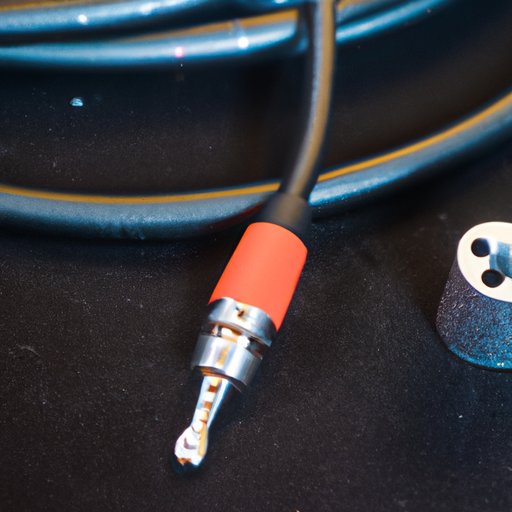Introduction
Choosing the right gauge of speaker wire is an important step in setting up a home theater or audio system. Not only will the right gauge ensure maximum performance and sound quality, but it can also help avoid potential damage to your equipment. But with so many different types of speaker wire available, it can be hard to know which one is best for your setup.
In this article, we’ll look at what speaker wire gauges are, explore the benefits of different gauges, and provide a comprehensive guide to choosing the perfect fit for your system. We’ll also compare different gauge speaker wires to help you make an informed decision.
Defining Speaker Wire Gauges
Speaker wire gauge refers to the diameter of the conductor—or the metal inside the wire that carries the electrical signal from the amplifier to the speaker. The lower the number of the gauge, the thicker the wire. For example, a 16-gauge speaker wire has a larger diameter than a 20-gauge speaker wire.
The thickness of speaker wire affects the amount of current that can flow through it. Thicker wires can carry more current, while thinner wires can carry less. This is important because the amount of current that flows through the speaker wire determines the overall sound quality of your system.

Exploring the Benefits of Different Gauge Speaker Wire
Different gauges of speaker wire offer different benefits. Thicker wires can carry more current, so they are better for long runs and high power systems. On the other hand, thinner wires are better for short runs and low power systems.
Thicker wires also tend to be more durable, as they are better able to resist wear and tear over time. Thinner wires, on the other hand, are more flexible, making them easier to work with. They also tend to be cheaper, so they can be a good choice if you’re on a budget.

Choosing the Right Gauge of Speaker Wire for Your System
Now that we’ve explored the benefits of different gauges of speaker wire, let’s take a look at how to choose the right gauge for your system.
A Guide to Understanding Speaker Wire Gauges
When choosing a speaker wire gauge, it’s important to understand how much current your system needs. If your system requires a lot of current, then you’ll need a thicker wire. If your system requires less current, then you’ll need a thinner wire.
You should also consider the distance between your amplifier and your speakers. Longer distances require thicker wires to ensure maximum sound quality. Shorter distances require thinner wires. Additionally, if your system uses multiple speakers, you may need to use thicker wires to handle the extra load.
What You Need to Know About Speaker Wire Gauges
When choosing a speaker wire gauge, there are a few things to keep in mind. First, make sure that the gauge you choose is compatible with your system. Second, consider the distance between your amplifier and your speakers. Third, make sure that the wire you choose is capable of carrying the amount of current your system requires.
Finally, it’s important to remember that thicker wires are more durable and better able to resist wear and tear over time. However, thinner wires are cheaper and more flexible, so they can be a good choice if you’re on a budget.
How to Pick the Perfect Gauge of Speaker Wire for Your Setup
Once you’ve determined the type of speaker wire you need, it’s time to pick the right gauge. Start by measuring the distance between your amplifier and your speakers. Then, calculate the amount of current your system requires. Finally, use this information to determine the ideal gauge of speaker wire for your setup.
Comparing Different Gauge Speaker Wires for Maximum Performance
Now that you know how to choose the right gauge of speaker wire for your system, let’s take a look at how different gauges affect performance.
Exploring the Pros and Cons of Different Gauge Speaker Wires
Thicker wires are better for long runs and high power systems, as they can carry more current. However, they are more expensive and harder to work with. Thinner wires are better for short runs and low power systems, as they are cheaper and more flexible. However, they can’t carry as much current.
Analyzing the Impact of Different Gauge Speaker Wires on Audio Quality
The amount of current that flows through the speaker wire determines the overall sound quality of your system. Thicker wires can carry more current, so they are better for producing higher quality sound. Thinner wires can carry less current, so they are less effective at producing high quality sound.
Maximizing Performance with the Right Gauge of Speaker Wire
The key to maximizing performance is to choose the right gauge of speaker wire for your system. Take into account the distance between your amplifier and your speakers, the amount of current your system requires, and the pros and cons of different gauges. With the right gauge of speaker wire, you’ll be able to get the most out of your system.
Conclusion
Choosing the right gauge of speaker wire is essential for getting the most out of your home theater or audio system. Thicker wires are better for long runs and high power systems, while thinner wires are better for short runs and low power systems. In addition, the amount of current that flows through the speaker wire determines the overall sound quality of your system.
By understanding speaker wire gauges, exploring the benefits of different gauges, and comparing different gauge speaker wires, you’ll be able to choose the perfect fit for your system and maximize performance. With the right gauge of speaker wire, you’ll be able to enjoy the highest quality sound possible.


